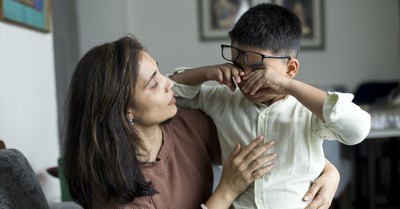Should Parents Talk to Their Kids about Scary World Events?
Parenting


Audio By Carbonatix
By Annette Griffin, Crosswalk.com
As much as we desire to protect our children from the harsh realities of the world, there’s no denying scary things happen. Over the past few years, reports of natural disasters, the global health crisis, school shootings, violence, and wars have filled the airwaves. And with one tap of a screen, our children gain unlimited access to information and misinformation about these events on a regular basis. Is it any wonder that the number of children and teens diagnosed with anxiety disorders has reached an all-time high?
Since this digital age has made it virtually impossible to shield our children from disturbing news, parents have no choice but to address the issues head-on. With God’s help, we can provide balance and truth that will empower kids to walk in freedom from fear. Here are some tips to use when talking to children about scary world events:
Before discussing the event, take inventory of your own thoughts and feelings.
Have you ever wondered why flight attendants instruct parents to put on their own oxygen masks before assisting their kids in an emergency situation? The answer is simple. Without oxygen, parents may not have the mental and physical capacity to adequately help their children.
Likewise, it’s prudent—and okay—for parents to deal with their own fears before attempting to help children face theirs. Like it or not, kids can sense our inner turmoil no matter how skillfully we try to hide it.
Before discussing the event, take time to surrender your own concerns to God. Seek guidance and support from family, friends, a pastor, and/or a counselor until you’ve found a measure of peace that you can pass along to your child.
“Cast all your anxiety on him because he cares for you.” (1 Peter 5:7)
Proactively start the conversation, tailored to your child’s emotional maturity.
School-aged children will inevitably hear the buzz about world events from classmates, teachers, and social media. Don’t wait for them to seek your help in processing the news.
Ask probing questions that will help you discern what your child already knows about the situation. Clear up any misinformation and provide additional facts to help satisfy their curiosity. But don’t go overboard. While we can’t shield children from all tragic news, we shouldn’t force-feed it to them either. Overexposure to knowledge that they are not yet ready to process can lead to more anxiety.
Avoid binge-watching ongoing media coverage during a national or global crisis, as much for your own sake as for your kids’. It’s wise to stay well informed about current events, but the constant flow of repetitive and sensationalized reports can do more harm than good.
Younger children may not understand what’s happening, but chances are if an event is widespread enough, they’ll be impacted by the weight of mounting tension.
Even though preschoolers may not be able to fully verbalize their anxiety, signs of insecurity can manifest during playtime, mealtime, and naptime. Watch their interactions with other children, observe their artwork, keep track of any changes in appetite or sleep patterns. If you see any indicators of distress, take time to verbally reassure little ones that they are safe and secure. “Short, direct, and reassuring—without the scary details—is the best way to proceed with your very young kids,” advises Dr. Nina Kaiser, a parenting expert and licensed child and family psychologist.
“When I was a child, I talked like a child, I thought like a child, I reasoned like a child...” (1 Corinthians 13:11a)
Engage in active listening.
Don’t just hear what your child has to say—really listen. The time you set aside to talk with your child about a scary event should be free from all distractions and void of any physical or mental multi-tasking. Clear your schedule, put your lingering thoughts on hold—and just listen.
Active listening helps parents understand and retain the information being conveyed, and it provides your child with the assurance that you care about what they’re saying.
Active listeners never interrupt, they make eye contact with the speaker and provide nods and quick verbal affirmations at pivotal points in the conversation, they observe body language, and they rephrase and repeat what they’ve heard when asking questions to gain clarity.
Listen to your child’s verbal concerns, but also listen between the lines. Draw out what’s at the heart of their fears by giving them a safe place to vent. Don’t try to talk kids out of feeling the way they do about the situation. There will be time to provide guiding truth, but your child will be more open to receiving that truth if they feel understood first.
“The purposes of a person’s heart are deep waters, but one who has insight draws them out.” (Proverbs 20:5)

Provide “carriable” answers to hard questions.
While on a train ride as a young girl, Corrie Ten Boom once asked her father to explain the meaning of “sexual sin,” a term she’d heard at school. Rather than answering Corrie’s question directly, her father reached for his heavy suitcase and sat it on the floor in front of his daughter. “Will you carry it off the train, Corrie?” her father finally asked.
After a futile struggle with the weighty bag, Corrie finally confessed that the suitcase was “too heavy,” for her to carry.
Her father wisely replied, “Yes, and it would be a pretty poor father who would ask his little girl to carry such a load. It’s the same way, Corrie, with knowledge. Some knowledge is too heavy for children. When you are older and stronger you can bear it. For now, you must trust me to carry it for you.”
Honesty is the best policy when answering our kids’ hard questions. But that doesn’t mean parents need to offer every detail of the facts. Simple answers are best. When explaining scary world events only provide age-appropriate information that your child can emotionally “carry.”
You can build on those simple answers as the child matures and has time to process, adding just enough weight to make the knowledge manageable. The goal is to equip kids with enough information to help them make sense of their world and feel safe there. Let kids know they can always find refuge in God. Pray with them and ask God to guard their hearts and minds in Christ Jesus.
“Do not be anxious about anything, but in everything by prayer and supplication with thanksgiving let your requests be made known to God. And the peace of God, which surpasses all understanding, will guard your hearts and your minds in Christ Jesus.” (Philippians 4:6-7)
Look for teachable moments and practical ways to help.
The first priority when talking with our kids about a scary event is to help replace their fear and anxiety with peace and understanding. A parent’s job is to provide a safe haven for kids to learn and grow. Once that security is established, it’s important to teach our children the importance, beauty, and necessity of compassion.
Compassion compels us to look beyond our own concerns to help meet the needs of others who are suffering. If we can cultivate compassion in our kids, they’ll be able to see scary events in the world as opportunities to help and serve—rather than a reason for worry and fear.
Under careful supervision, allow your kids to witness some of the suffering that occurs after a crisis event, especially the suffering that affects children. Look for cues that your child’s heart is being softened to the plight of those in distress and use moments of tenderness to engage in open dialogue about things you might do together to help.
“do not merely look out for your own personal interests, but also for the interests of others.” (Philippians 2:4, NAS)
Address the whys and what-ifs.
If it were possible to dissect anxiety and study its inward parts, I’m convinced we’d find every unanswerable why and what if clustered there in mass.
According to Paul Harris, a Harvard-based child psychologist, “a child asks around 40,000 questions between the ages of two and five.” And any parent of a preschooler can tell you that most of those questions begin with the word why.
Sometimes it’s impossible to explain why a tragic event occurs, and it’s dishonest to assure a child that the what-ifs will never invade their safe space. Questions like, “why did that boy kill all those kids at the school?” or “what if Grandma gets the virus and dies?” are questions that can weigh heavy on a child’s heart, and parents shouldn’t avoid them.
It’s okay to admit to your child that the answer to their question is complicated. Christian parents can use the whys and what-ifs to introduce or reinforce deep truths about God’s Word, His character, and His promises to their children—who are ultimately searching for security and hope that can only be found in Christ.
“I have told you these things, so that in me you may have peace. In this world you will have trouble. But take heart! I have overcome the world.” (John 16:33)
Annette Marie Griffin is an award-winning author who writes timeless pieces that help wanderers find home. She’s a columnist for StarLight Magazine for kids, and she teaches writing workshops at local and national conferences. When Annette isn’t writing, teaching, or speaking she enjoys making memories with her brilliant husband, three adult children, two teens, and four adorable grands.

























